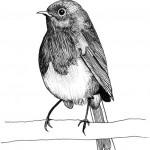Yesterday I attended the National Trust’s ‘Natural Childhood’ Summit, designed to bring together stakeholders and influencers to work together on curing the disease of disconnection from nature in children. I use those words knowing that they are both problematic and provocative – you might argue that everything around us (cars, buildings, TV) is in fact ‘nature’ as it is created by us – yet we are talking about something specific here: people’s continuing and worrying absence from time spent in the natural world, the grass, trees, hills, rivers, seasides and fields of our landscape.
In contrast to the (usual) landscape in autumn, it is a depressing picture out there. Extensive studies and research now clearly links an absence of free time spent slowing down and being in nature as having a tangible detrimental effect on the human animal and yet funding for conservation projects or schemes that get people outside are being routinely cut. Schools cannot afford to run the kind of residential programmes that took kids into nature anymore and misunderstood health and safety fears have put pay to us letting our children play out. The problem is serious, getting worse and children are suffering for it, as Stephen Moss’ brilliant report for the National Trust details.
Conversely, we all know nature is good for us, physically and psychologically. As Leo and I ask in our book Skimming Stones and our talks and workshops…why would anyone pay more for a room with a view otherwise? And we’re not talking about grand nature here either; research shows that as little as half an hour spent in a green space (think of a back garden, the waste ground just over the garden fence, the city park) can have affect a profound transformation in our levels of stress, anxiety, depression, etc. I wrote a blog post for the National Trust which went live yesterday during the event which covers something of how I feel about the situation. You can read it here.
I believe nature is a birthright; our access to it and time spent in it should be protected like any other basic human right. Yet the mechanisms for change in a government and many national organisations can be frustratingly slow. Mankind’s gift of objective thought, self-awareness and ability to predict the what will happen in the future is blunted into uselessness by our incessant selfishness and innate inability to come together as a species and work to fix future issues.
That’s why the summit yesterday was an optimistic experience. There was a glimpse, albeit a small one, of the many disparate groups that are totally committed to addressing these issues coming together, thinking creatively and looking at how we can affect a change and gain some ground. The ideas of the brilliant David Bond of Green Lions are a great example: making a film on his attempts to start a ‘nature’ brand to compete with all the other products that vie for our children’s attention, starting up ‘Project Wild Thing‘ to get people to pledge the same amount of time outside as they do in front of a screen and suing brands that appropriate a natural symbol (Apple, The Conservatives, Labour, Lib Dems, BP, etc) but without any benefit to or connection with nature. These ideas may be doomed to fail, but they are intentional failures to make a point; the team is creating statements that resound in any viewer. Similarly inspirational are organisations like Good For Nothing, where super-smart folk with creative power share skills, work on providing solutions and making things happen for conservation and outdoors charities. With people like this on the team, the weight of the larger conservation and ‘nature’ charities have a real chance of creating change.
 The standout speaker yesterday was naturalist and TV presenter, Chris Packham. Ruthlessly self-critical and self-aware of the paradox of being a TV presenter and yet calling for more people to engage with the outdoors, he is that rare thing: insanely knowledgable, committed and passionate about conservation and nature. His talk touched on many of the points we explore in Skimming Stones and few in the room were left in any doubt about the depth of his conviction and obsession. Childhood stories about tracking animals, collecting fox skulls, keeping an obsessive nature diary (aged 11) and going into mourning over the death of a kestrel were poignant and particularly relevant to me, given my current writing project.
The standout speaker yesterday was naturalist and TV presenter, Chris Packham. Ruthlessly self-critical and self-aware of the paradox of being a TV presenter and yet calling for more people to engage with the outdoors, he is that rare thing: insanely knowledgable, committed and passionate about conservation and nature. His talk touched on many of the points we explore in Skimming Stones and few in the room were left in any doubt about the depth of his conviction and obsession. Childhood stories about tracking animals, collecting fox skulls, keeping an obsessive nature diary (aged 11) and going into mourning over the death of a kestrel were poignant and particularly relevant to me, given my current writing project.
His final point about the real dying breed in Britain being the naturalist was something I have talked about before and had covered in the National Trust blog. Getting children outside at an early age to appreciate the splendour and unworldly wonder of watching a butterfly emerge or a trout rise, seeing roe deer in the morning mist a mile from a busy urban road – these are the experiences that draw children and adults outside and get them to fall in love with their environment and the natural world. There is no such thing as a retired naturalist for a very good reason.
– Rob –


